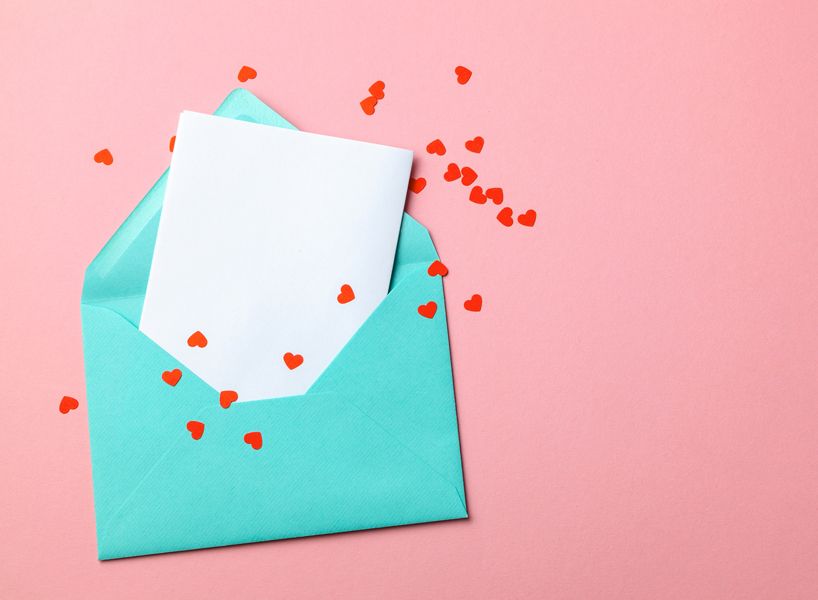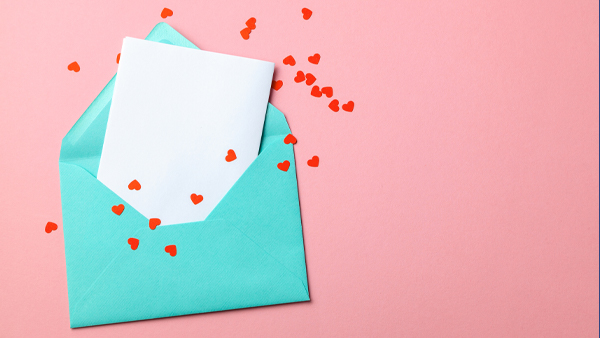For Three Years, I Spoke to My Long Distance Boyfriend Through Handwritten Letters

I was determined to go on a dating spree as a gift to my mother for her 70th birthday. I had purchased a real present (of course) but thought what she really wanted was for me to (finally) find a boyfriend. She knew that I didn’t have the best luck with men, that my dating history was largely a string of uninspiring dates. She did not know about the recent, devastating end to my beautiful and unusual relationship with a man 7,000 kilometres away. He would not have been a satisfying answer to her boyfriend question, anyway.
We met at school in Paris in 2014. We were taking humanities classes at the Paris-Sorbonne University. He was a devout Muslim 11 years my junior and we spent two weeks wandering the City of Lights during the holy month of Ramadan. I’m a secular Jew, so respectfully refrained from baguettes and rosé, fuelled instead by giddiness, curiosity. For three years after returning home, our words crossed the Atlantic between urban North America—I live in Toronto—and rural North Africa—he was in Algeria.
I knew what we were doing was on the extreme end of the relationship spectrum. It was like a courtship in Victorian times. In a dating world full of indecency—I’d received an unsolicited dick pic, been ghosted by a rabbi-in-training—this man in Algeria was decent. Despite not being “supposed” to like him according to familial and cultural expectations—we were worlds apart with enormous gaps in age, culture and class, and from religious backgrounds that don’t always click—I remained open. He was endlessly interesting and I wanted to know everything.
The evening before my dating spree began, my mother, brother and I had swirled, uncharacteristically, into a discussion about my dating life. My family and close friends don’t usually ask about it because why bother with ridiculous stories about my attempts to meet men from the depths of the internet? They are undeserving of space and attention.
Those who do inquire on whether I’ve met anyone typically offer unsolicited advice, as though my being single were an illness to overcome. “Have you tried…,” they ask. “What about…,” they suggest. “I know someone who…,” they offer. These conversations make me feel like I’m drowning.
That night with my mother and brother, I cried from fury and disappointment. Even they were turning on me. The following morning, I signed back up for Bumble. You want me to go on dates? Oh, I’ll show you dates.
I matched with someone who had only emojis in his profile. He invited me for a drink and I said yes. This was a spree, after all.
It was Friday and we agreed to meet at a bar not far from my condo. I arrived a couple minutes early, the cozy space abuzz, and snagged a spot for us to sit.
I got stood up.
I was incensed.
I thought of comedian Larry David: “He could at least lie to me. I don’t want to sit there like a schmuck. A lie is a gesture, a courtesy, a little respect.”
The next day, I told Mom I was no longer trying to meet men on the internet. It wasn’t solely because of this guy. I’d done it all: speed dates and blind dates (including my ex-fiancé, a nice Jewish man). Jdate and OkCupid. Tinder, Hinge and Bumble. It’s discouraging, disappointing and enraging.
Being stood up by this stranger felt particularly jarring. He presumably had his phone in his hand 24/7 and couldn’t send a text?
My man in Algeria could not afford his own computer, smartphone or regular internet access. He wrote from an internet café. He lives somewhere internet cafés exist.
When he could afford stamps, he mailed letters. I cried while plucking them from my metal mailbox like gems, weeks after they’d been sent. Swirly handwriting in French, English and Arabic on plain paper, lined paper, graph paper and postcards. Always, stamps with pink roses. There were flattering, romantic statements in each—he was truly poetic and everything felt more so in French—but mostly it was mundane: books, family, work, weather. It didn’t matter what he said. The important part was that he demonstrated he cared about me by participating in the seemingly ancient art of snail mail. In a world where connection is disposable, where you can “unmatch” in an instant, his letters felt extraordinary.
We also sometimes communicated through Facebook. But I knew as I was living it that our correspondence was far too copious and precious to be trapped in the clutches of Mark Zuckerberg’s Messenger. If the algorithm changed or we stopped being Facebook friends, I didn’t want our messages, our lives, to be lost in cyberspace. At the end of each month, I copy and pasted our correspondence and emailed it to myself for safekeeping. In the end, we exchanged nearly half a million words. An impressive contrast from the usual: “Hey.” “Sup.” “I like thin athletic girls, can you post more full body shots?” It felt thrilling that someone wanted to know me more deeply than emojis and swiping typically allow.
Eventually, unsurprisingly, we reached an impasse due to ideological beliefs and things fell apart. But for the years it lasted, this relationship felt like the most exciting thing that happened to me. It was emotional and intellectual. It was slow and steady. It was infinitely more interesting than scrolling endlessly through dating apps. Being stood up from Bumble is more common than criss-crossing the Atlantic, but why is being treated badly while dating so acceptable? Why are relationships that end in marriage the only kind we still seem to celebrate? What is the rush?
In the end, my mother got a birthday gift plus a trip home from my brother and me. I’m (still) single, and while I haven’t talked to my man in Algeria in years, I have his letters. Sometimes, I take them out from the book in which they are kept, spread them across my bed, and marvel. These letters are proof that he existed, that we existed, together. There is no app for that.
The post For Three Years, I Spoke to My Long Distance Boyfriend Through Handwritten Letters appeared first on FASHION Magazine.
